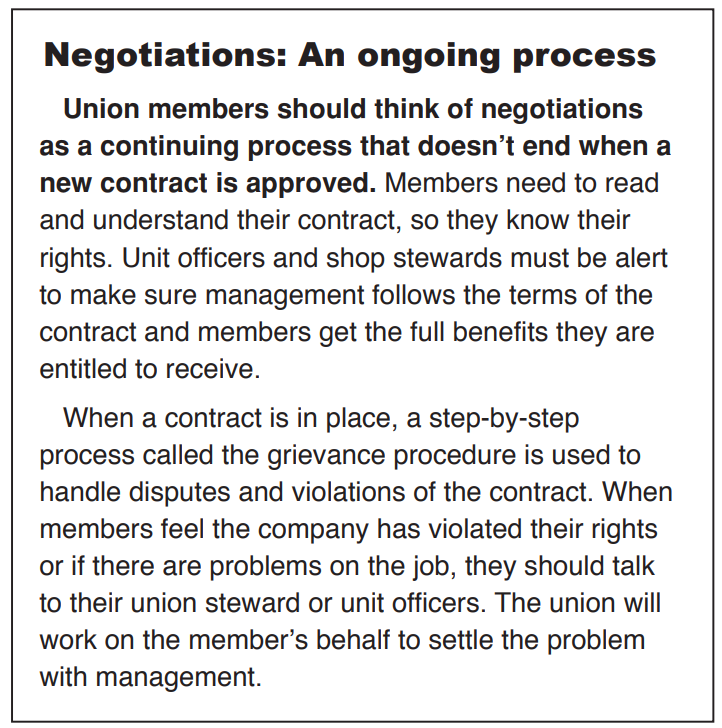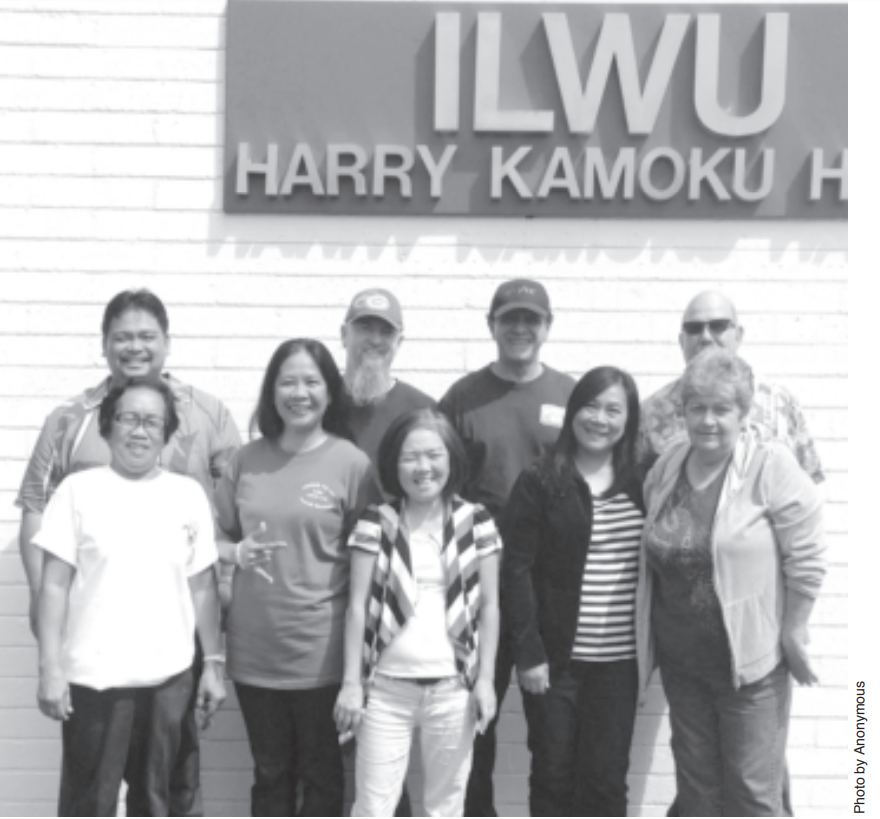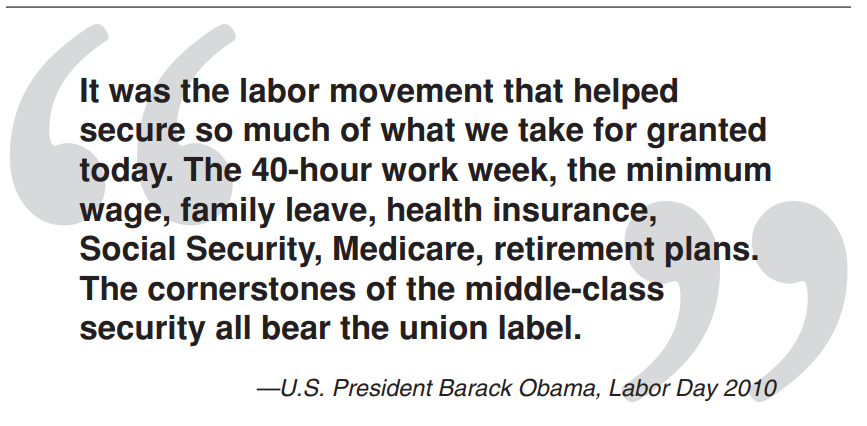Contract negotiations is a good example of ILWU democracy in action.
Unit members meet to propose changes to their union contract and elect members to their negotiating committee. The union negotiating committee should include members from different departments and job classifications. While committee members may come from different departments or jobs, they should work for a contract that is best for the entire membership.
The union committee then meets with management, who may also have proposals to change the contract. In these meetings, one side will explain their proposals and the other side may accept, reject, or make counter proposals. As these meetings continue, both sides gain a better understanding of each other, problems are solved, and agreements are reached on many issues.
When the union committee and management feel they have bargained over all the important issues and have an acceptable contract, the union will hold membership meetings to explain the details of the settlement and take a vote. ILWU policy requires membership approval of any settlement reached by their negotiating committee on a new contract.
1) ILWU members prepare for contract negotiations at least six months before the contract expires. They hold membership or department meetings to propose changes to their union contract. These proposals address problem areas, try to obtain long standing goals such as job security, or seek improvements in wages and benefits. The unit will organize members to support the union.
2) Unit members meet to approve the final set of proposals and elect a committee of their fellow workers who will meet with management to negotiate a new contract. The committee is usually composed of unit officers and members who should represent the interest of all groups within the membership. This ensures unity and solidarity among all groups within the unit.
3) An ILWU full-time officer will serve as the spokesperson for the unit’s negotiating committee. At the first meeting with management, the union explains their proposals, and management may also introduce proposals. Each side will meet separately to discuss the proposals. They then meet together to accept, reject, modify, or drop the proposals.
4) This process of meeting and discussion over proposals by each side can take weeks or months. During this process, the original proposals often change as both sides must compromise to reach an agreement.
5) In tough economic times, some employers may demand wage and benefit cuts in negotiations. The union may propose a joint union management committee to find other ways to cut costs or require management to have a financial plan for recovery. The union may agree to temporary reductions but will require management to show proof of their financial condition. The union negotiating committee must keep their members united and informed during negotiations.
6) ILWU policy requires the final agreement must be approved by the members affected. The union will hold membership meetings to explain the agreement and take a vote. If a majority of members approve the agreement, then that becomes their new union contract. If the majority votes against the agreement, then the union may ask members if they are willing to strike or support other economic action to get a better agreement. The union will then go back into negotiations with management.
7) After a settlement is approved, a new contract is prepared by the union or employer. The union committee will meet to make sure every word of the new contract is correct. The contract is signed by an ILWU titled officer and the employer. Copies of the contract are printed and given to all members.
8) Members should read their contract and know their rights and benefits. Members should always see their unit officers or shop steward if they have questions about the contract or a problem on the job. Unit officers and stewards are trained to enforce the union contract, solve problems with management, and involve members in the union.
9) Every ILWU unit has a business agent assigned to service that unit. The business agent regularly visits each unit to assist unit officers and stewards. Business agents should take unit officers and stewards with them whenever they meet with management. The business agent should help units recruit stewards from every department.
10) The union is strongest when every member is involved. This is the foundation of ILWU rank-and-file unionism.

Love’s Bakery ratifies new statewide contract

Love’s Bakery Negotiating Committee (standing, l-r): Oahu Division Business Agent Brian Tanaka, Jade Kaneshiro, Jason Oshiro, Cary Oshiro, Dennis Brock, Patrick Souza, Boyd Isnec, and Oahu Division Business Agent Wilfred Chang Jr. (Sitting, l-r): Dorothy Pugay-Correa, Michael Wakita, Barrett Hayashi, Local Vice President/Spokesperson Teddy Espeleta, Lynden Koerte and Anthony Corniel. Not pictured: Hawaii Division Business Agent Francine Molina, Kauai Division Business Agent Calvin Corpuz, and Maui Division Representative Steven Lee.
HONOLULU—Did you know that half the sliced, sandwich-style bread sold in stores throughout the state is baked and frozen on the mainland, shipped across the ocean to Hawaii, then thawed out before being sold in stores?
If that doesn’t sound very fresh or appealing to you, don’t worry—your union brothers and sisters at Unit 4402 - Love’s Bakery produce 206 varieties of bread, 70 varieties of buns and rolls, and 14 varieties of cakes, all baked fresh in Hawaii. Love’s Bakery has been in business for over 162 years since 1851 and employs more than 250 ILWU members, including all employees of the production, sales, clerical and maintenance departments. Love’s also has seven thrift store outlets throughout the islands.
ILWU-Love’s Bakery contract ratification meetings were held April 1-10, 2014, at locations throughout the state and the memorandum of agreement (MOA) was approved overwhelmingly. The duration of the new contract is five years with a 12% wage increase over the life of the agreement. The union was also able to obtain a substantial increase in contributions to the pension plan.
Mauna Loa Macadamia Nut Corp. workers ratify contract
Corp.’s first macadamia nut trees were planted in 1946 in Keaau. In 1976, Mauna Loa began converting old sugar plantations to macadamia plantations when the sugar industry began to wane on the Big Island. Mauna Loa’s primary nut processing plant is located in Keaau and currently employs 170 ILWU members.
Mauna Loa began in the second week of April 2014 and lasted slightly over a week. “Negotiations went smoothly due to the diligence and cooperation of both the union negotiating committee and management,” said spokesperson and Hawaii Division Director Elmer Gorospe. “I believe that efforts to build a good working relationship between the union and management over the past years have had a positive impact on collective bargaining.”
On April 21, 2014, ILWU members voted overwhelmingly to accept their new collective bargaining agreement (CBA). “The negotiating committee deserves thanks and recognition for all their hard work,” said Gorospe. “They made some very difficult decisions and did a good job in negotiating a contract that balances the needs of different groups of workers, and is beneficial for the unit as a whole.”
The new contract will be in effect for five years, with a 13.5% wage increase over the duration. Other improvements include wage adjustments for all trade workers, classification upgrades, a $1.00 increase in pension contribution for both intermittent and regulars employees, and a secured co-share payment for five years under the ILWU Local 142 (General Trades) Health & Welfare Trust.

The members of the Unit 1402 - Mauna Loa Macadamia Nut Corp. negotiating committee bargained a contract for the largest general trades unit on the Big Island. Front row, left to right: Leonor Corpuz, Mercedes Habab, Jeanne Yoshizawa, Sonia Tejada, and Wilma Revilla. Back row, left to right: Division Director and spokesperson Elmer Gorospe, Burton Wallen, Mel Morales and “ Business Agent George Martin.

